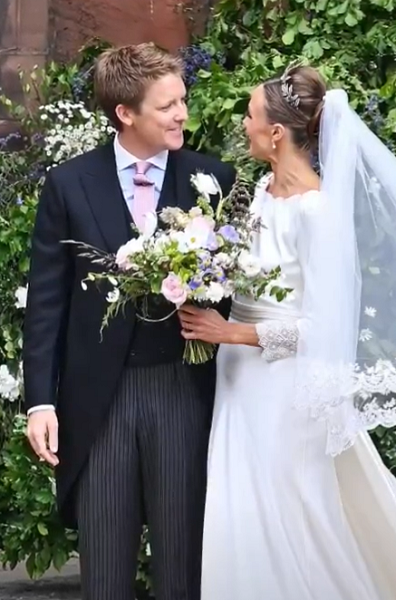
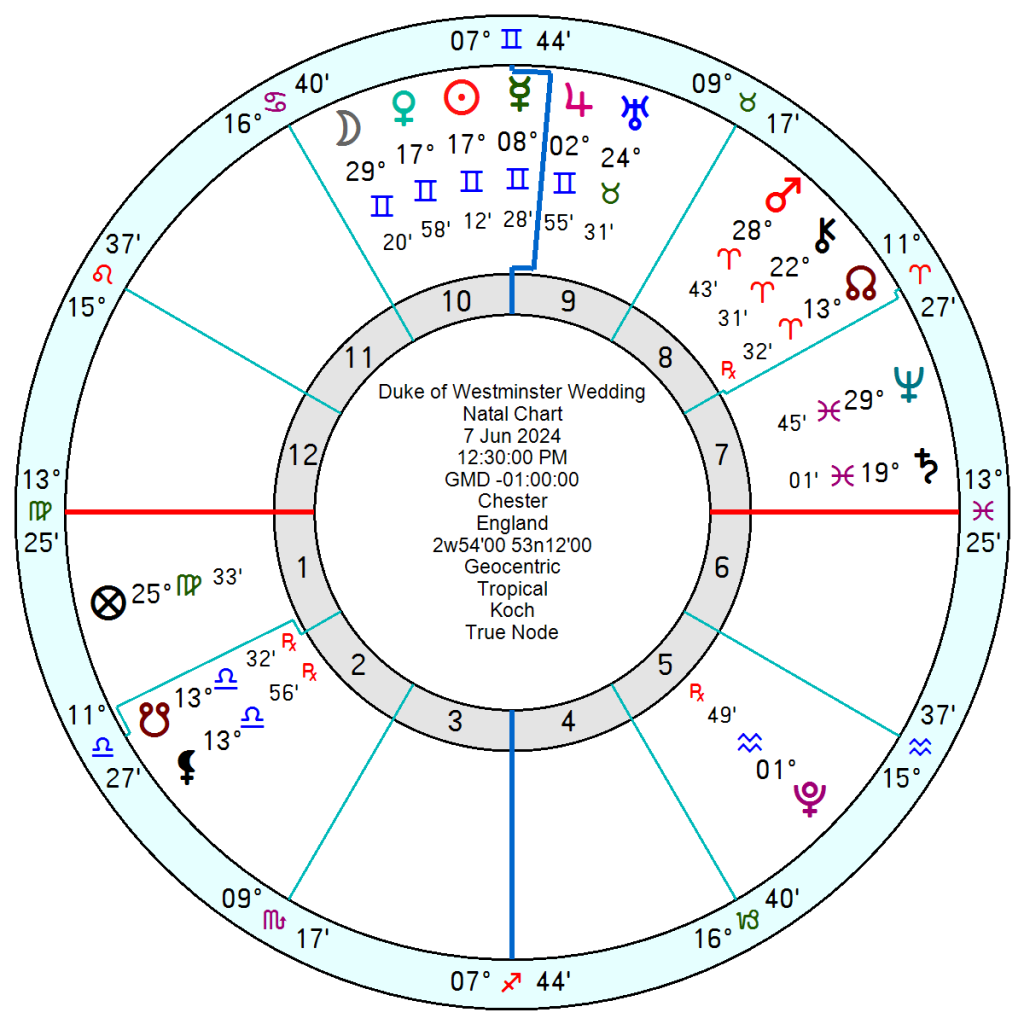
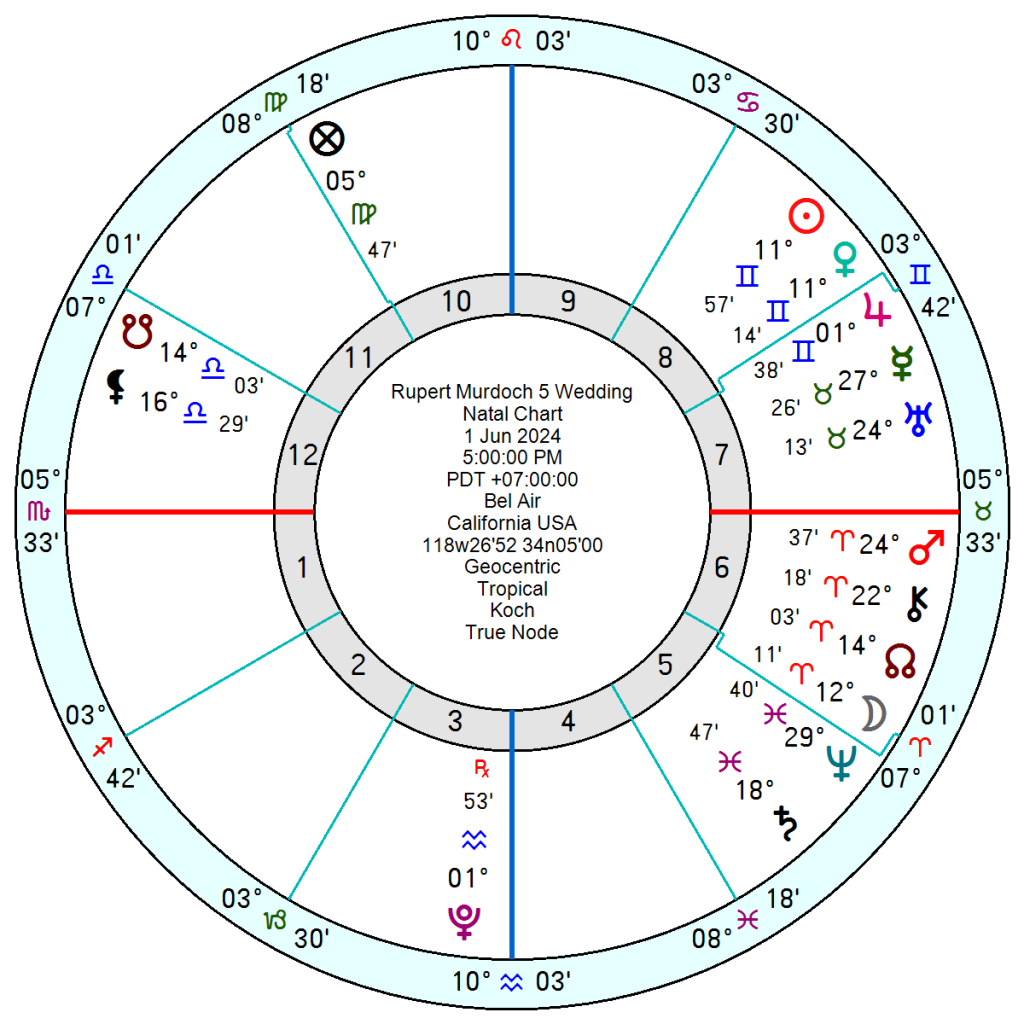
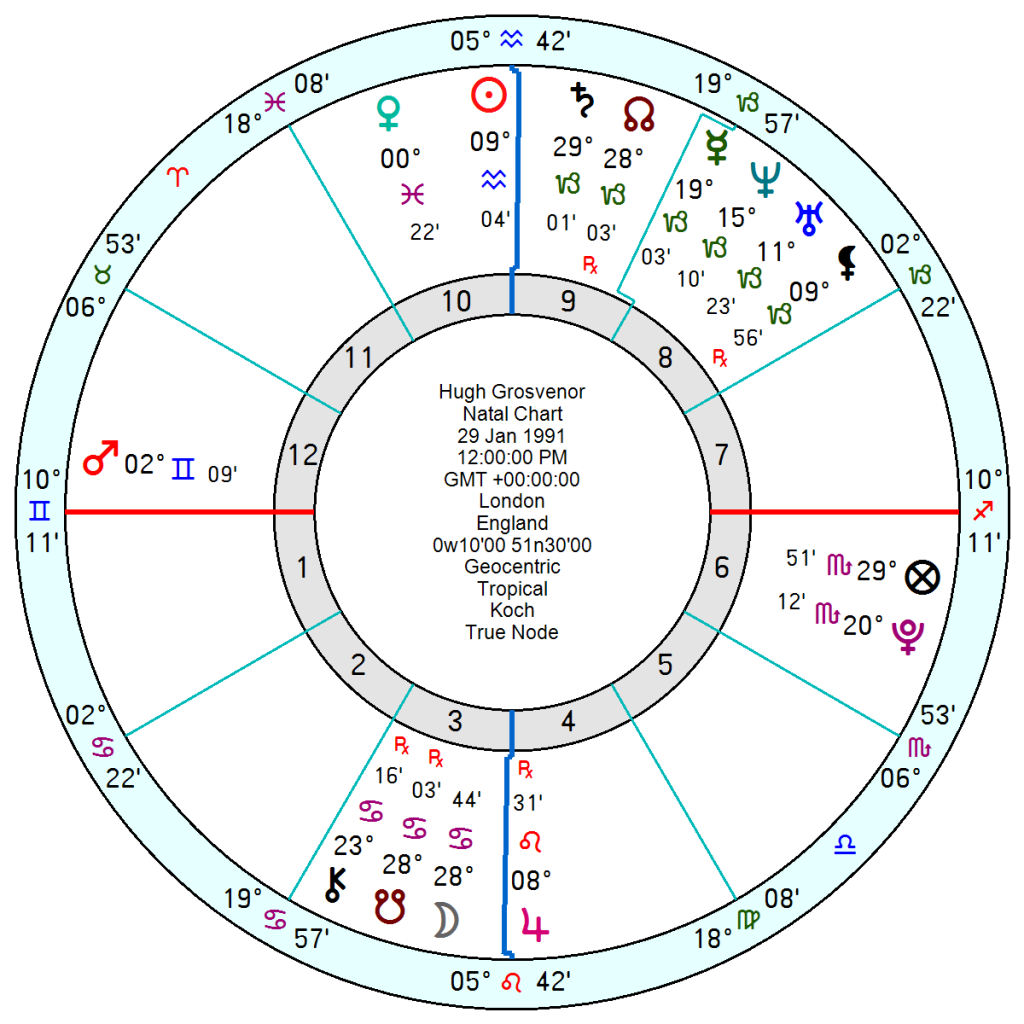
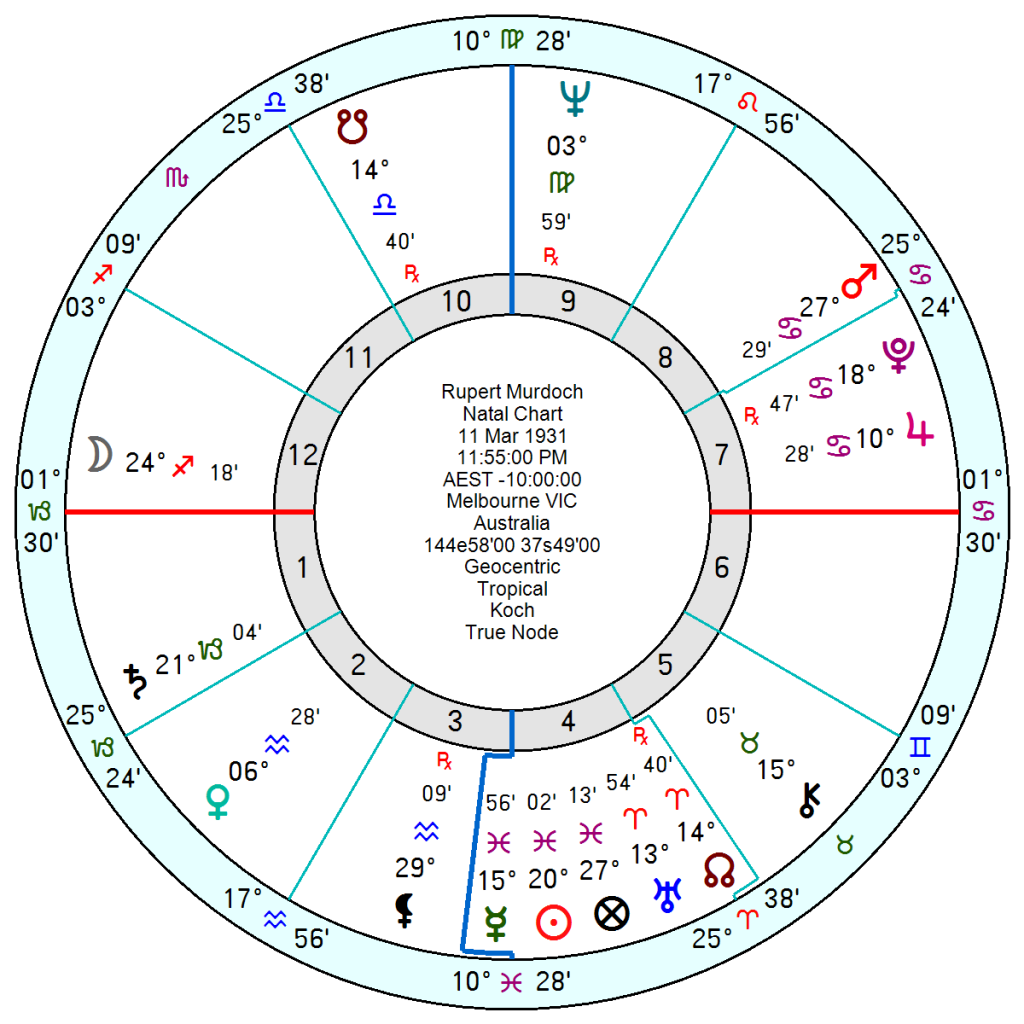
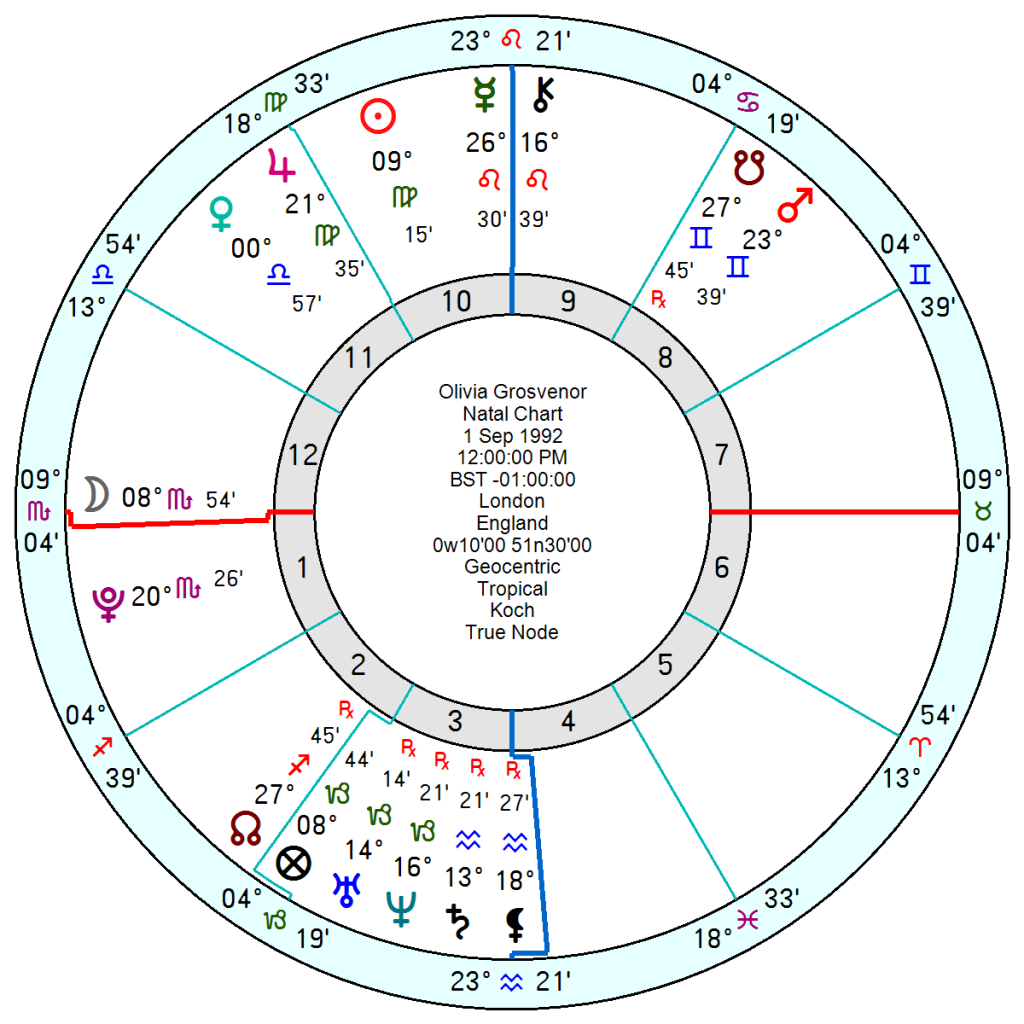
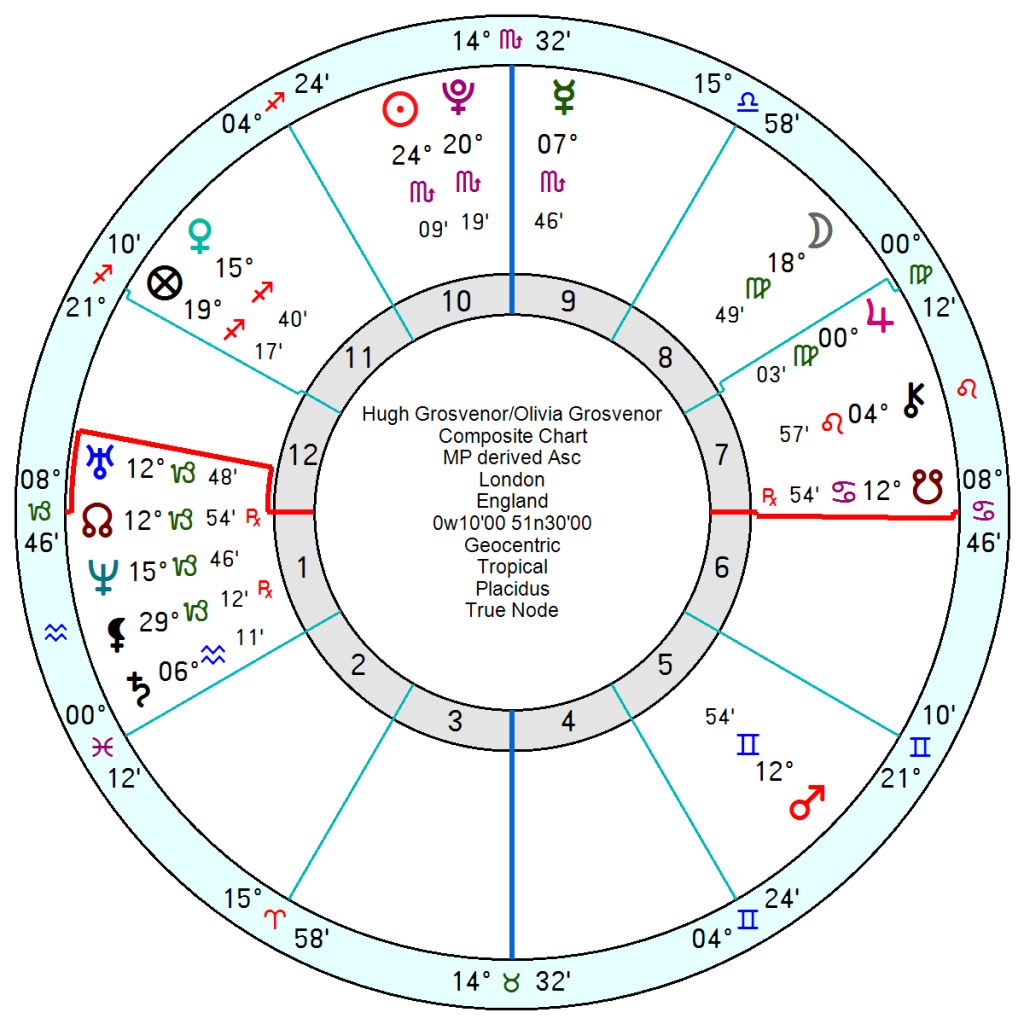
Two weddings amongst the wealthy elite caught varying oohs and aahs over the past week. The young Duke of Westminster worth a cool £10 billion married his elegant bridge with the Prince of Wales as usher yesterday. And last weekend Rupert Murdoch, worth circa $20 million USD, got hitched for a fifth time.
Not surprisingly both wedding charts are reasonably similar with a super-successful, super-confident Jupiter in Gemini trine Pluto; an affectionate, superficially sociable Sun Venus, though in a workmanlike square to Saturn. Both intriguingly have Chiron close to Mars hinting at a marriage ahead of compulsive doing – non-stop-go. As well as a tendency to attract anger from others.
Rupert Murdoch, 11 March 1931 11.55pm Melbourne, Australia has his Sun/Moon midpoint conjunct his Venus so he will head for love like a moth to a flame. His Venus falls in his 2nd so one might wonder about the financial complications and attractions thereof. He also has Jupiter and Pluto in his 7th so close relationships will be both easy to attract and difficult to maintain harmoniously.
The young Duke of Westminster, Hugh Grosvenor, 29 January 1991, London, no birth time, inherited when his father died in his mid sixties from a heart attack in 2016. He is a Sun Aquarius opposition Jupiter, with his Saturn, like Murdoch born sixty years before, in Capricorn. In Westminster’s case his Saturn is conjunct his North Node for a heavy burden of material wealth to bear. His wedding chart also has Neptune in Pisces square the Moon (Cancer/Gemini depending on when the vows were taken) which is not ideal domestically – unrealistic, vague, disappointing.
The Moon on Murdoch’s wedding chart is in Aries (probably late afternoon LA wedding) conjunct the Aries North Node – good for public relations.
Bread and circuses for the masses.
Add On: A wiki birth date has appeared for Olivia, now Duchess of Westminster, 1 September 1992, born into a wealthy banking family.
If accurate, she is a Sun and Jupiter in Virgo, not conjunct, but both trine a Uranus Neptune conjunction in Capricorn – she is into sustainable/ethical food – very Virgo and Gen Z. Her Saturn is in knowledgeable/scientific; and Mercury is square an intense Pluto. Her Venus in sociable Libra has been enlivened by a romantic tr Pluto trine over last year and this.
Her husband is also of the inventive, inspired, can-be-dogmatic Uranus Neptune generation and both of them have Mars in argumentative Gemini. Her Moon is Scorpio and his Cancer/Leo.
Their relationship chart has a close composite Sun Pluto conjunction with a (perhaps) well aspected composite Moon square a passionate Venus opposition Mars. The composite Saturn is square Mercury and trine Mars – so their marriage understandably will be a weighty affair involving more practicalities and business than most.

Wow. I’m an American and lately I am hearing so many comments that start with, “All Americans think . . . ” or Most Americans assume . . .” The US is a huge, diverse and fractious country – and always has been. Professional pollsters can’t seem to agree on exactly what ALL or even MOST Americans are thinking. Please don’t assume you do, because you’d be wrong.
Hugh and Olivia have a very nice Mars trine Venus is synastry.
And if I’m seeing right, they have the Venus quincunx Venus aspect as well.
That’s nice. I thought they had a lovely vibe – easy, happy, normal. She definitely has the look of the Grosvenors. She could be one of his sisters, so should fit in well. Thank you, Marjorie, nice to have a change from the usual. If Rupert’s family leave them alone, they’ll probably be alright. She looks capable of withstanding them.
I read somewhere that Hugh’s father said his son was born when the tv programme Countdown was on. So presumable around 4pm.
I don’t know if this helps, Marjorie.
What a way to remember the birth of your only son!!!
Interesting! That would make him a Leo with the Moon on his ascendant. Makes sense, because there is this gingery Leonine blondness to him, also soft, softened by that Moon.
Wow, imagine the countdown music while you’re in active labour? I’d have come up with some 4 letter words alright. Makes me grateful I was NHS 😉
For a moment, Marjorie, I thought that the article referred to the relationship between the Westminster bubble and Murdoch, but it was a bit of a long shot to call it matrimony. Then I realised what you meant.
A few quick random thoughts on the Westminster marriage. The current Duke is the only male descendent of the first Duke of Westminster, which means that the line will die out if he does not have any sons. Do the charts say anything about the possibility of children?
Secondly, most Americans tend to think of the nobility in negative terms, mostly because they are ignorant of it, not having one themselves. The Dukes of Westminster are of course quite wealthy, owning much property in Westminster and central London. But they also provide social housing on some of that estate. The Grosvenor Estate is located within half-a-mile or so of the Palace of Westminster and is/was (some of it was sold off under Thatcher) social housing. It is built in land given by the Duke of Westminster to the Westminster City Council for a rent of 5p a year for the whole area (traditionally called a peppercorn rent) to provide housing for the “working classes”. In the 1980s, Westminster City Council tried to sell the housing to much more wealthier people, arguing that there weren’t any working class people in Westminster. The Duke tool the City Council to court, ironically on behalf of the working classes. See the Wikipedia article on “Westminster vs Westminster” for more information.
Also google “Grosvenor Estate Pimlico” for images of the estate in question, which has a distinct architectural design.
Finally, I hadn’t realised that “Hoare” was a banking family. The only Hoare that I know was Sir Samuel Hoare, the Foreign Secretary immediately before the start of WWII. He was forced to resign due to the Hoare-Laval treaty which made concessions to Italy after it invaded Abyssinia/Ethiopia. After he stood down, when his successor, Anthony Eden, had his first audience with the King, George V is said to have remarked “No more coals to Newcastle, no more Hoares to Paris.” Subtle, but very English.
One learns something new everyday. After me writing the post above, I googled “Grosvenor Estate Pimlico” and one of the articles mentioned that the estate was designed by Sir Edwin Lutyens, the designer of the city of New Delhi, which was to become the capital of British India and is now the residential location of most people in the government of modern India. It makes sense that the estate looks distinctive.
For Americans, be aware that the same English words can have different meanings in the UK depending on context. In most UK cities, “estate” typically means social/public housing (I believe the American equivalent is “project”, but I could be wrong). Many of the inner city estates are plagued with violence and knife crime, etc. The Aylesbury estate in central London was legendary for its violence. Its occupants have now been forced out and the area redeveloped into luxury housing (it was almost exactly a mile away from the Palace of Westminster, so very central).
So keep in mind that word may not have the same connotations on both sides of the Atlantic.
I’m always a little mystified when something like this is said to the Americans – don’t they intuit it or even, say, know? Surely many do. And it’s also a little weird that it is always the Americans that get the mention – no Canadians e.g. I did occasionally, I have to say, speak in Briticisms and found it so strange that Americans were baffled by my talk.
Most Americans, at least when interacting with the public from other countries, come across as wonderfully self-absorbed and self-centered. There are of course Americans (including some on this site) who are exceptions to the rule, but then it is the exception that proves the rule.
To many Americans, their way of doing something is the only conceivable way to do that thing. That other countries and/or cultures may have different approaches is shocking to them. Thence the regard they are given to them by the rest of the world.
Theer was a thread on X/Twitter a few weeks ago about the retrial of Lucy Letby (see if you can find it. Absolutely spectacular thread). American lawyers (who I would hope were better educated than the average populace) were outraged that (a) double jeopardy in the UK had been relaxed and (b) that a verdict could be given by a majority of 10-2 in a jury trial (there was yet another point of outrage but I have forgotten what it was).
In England & Wales (one legal jurisdiction), majority verdicts have been a thing for the past few decades. In Scotland, a majority decision of a jury (and in Scots law, juries in criminal cases have 15 people, not 12) has always been acceptable, provided at least eight jurors agree to it. These details blow the mind of Americans more than other cultures, used as they are to unchanged and unchangeable rules due to the rigidity of their written constitution.
Canadians, while heavily influenced by the neighbouring American culture, still have an underlying substratum of British culture. For a start, their famous apologetic nature almost certainly stems from British culture, which also has a tendency to apologise to others if you bump into them, for instance. Canada still has Tories and Liberal parties, both of which were also British political parties till the 1920s. The Canadian constitution has always taken the “living Constitution” approach of Viscount Sankey when interpreting its constitution, inherited from the British over the past few decades. And crucially, because they never became a superpower, they don’t have the arrogance of the Americans in assuming that the world needs to behave like them.
Oh, poor Americans! I reallylike them; they gave so many great things to the world. And there are many great things about America too.
I think, if one were to stereotype, Europeans see Americans as lacking refinement and polish, and Americans are generally not bothered by those kinds of things at all, being very practical and down-to-earth, whereas Americans see Europeans as snobbish, snotty, and a bit high of importance in their minds.
And regarding refinement, I remember that quote by Diana Vreeland “There are no chic women in America. The one exception is Nan Kempner.”
Harshish, but then Americans aren’t that bothered by fashion and appearance and looks as much as Europeans.
@El Aznar, it is not their sense of style or elegance that I care for. It is ironically the same mindset that I find annoying about my mother too; that once they have thought of something, their way is the right and only way, their inability to appreciate a different viewpoint. And neither the US (as a global power) nor my mother (as a domestic power) ever think of persuading others to their viewpoint. They both blithely impose their viewpoint on others, never mind that it either does not suit the situation for others or that others may have different approaches and thoughts. My mother is almost a spiritual American.
My message to both is that their opinions, your values bind just them, nobody else. If you want others to folow your values, your opinions, persuade and compromise. And learn to lose.
@UM, the term generally applied to this belief or attitude is “American exceptionalism,” something I gag over. But you see it over and over, especially with the “super patriots” on the right-wing and surrounding Trump. But the arrogant belief in the United States’ natural superiority permeates many segments of society, but is especially characteristic of people who have never traveled abroad or refuse to recognize other nations’ contributions or the value of other cultures.
Incidentally, some states in the US do allow majority rather than unanimous verdicts in trials, though more frequently in civil matters. As I recall a few years ago (before the current right-wing court), the Supreme Court barred non-unanimous verdicts in some criminal, especially capital, cases.
I don’t think they blindly impose their own viewpoints – if anything, I’m much more irritated by what I perceive as their fundamental and thorough disinterest in other peoples and cultures and ways of doing things. Often I’ll experience an enthusiastic and cheery Oh, that’s so interesting!, but in the end it will give the impression of being feigned and fizzle into nothing.
There are private housing estates too. And these are owner occupied. Social housing is for the most part, Council Estates.
Wikipedia article on Sir Thomas Grosvenor has the interesting origin of the family wealth:
“Grosvenor married in 1677; he was aged 21, and his wife, Mary Davies, was only 12 years old.[1] The marriage proved to be harmonious and conventional. Mary was the daughter of Alexander Davies, a scrivener (scribe), and she had inherited substantial land to the west of London from her great-uncle Hugh Audley. This was part of the Manor of Ebury (previously Eia), and Mary’s portion consisted of ‘swampy meads’ (marshland).[1] The area was later to become the Mayfair, Park Lane, and Belgravia areas of London; the most valuable parts of the Grosvenor Estate.”
It is amazeballs. Such a great story! From marches to riches. But they were also clever, wise, and strategic in building and maintaining it.
Brave’s Leo AI assistant has this description of the composite Sun–Pluto conjunction:
“Composite Sun Pluto conjunction
The composite Sun Pluto conjunction is a powerful aspect in the composite chart, indicating a deeply transformative relationship that can bring about significant changes in both individuals. This aspect can manifest in various ways, depending on the individual charts and the specific placements of the Sun and Pluto.
Key Themes:
Intensity and Passion: The composite Sun Pluto conjunction can bring intense passion and desire to the relationship, making it a deeply emotional and intimate connection.
Transformation and Change: This aspect can indicate a strong desire for change and transformation in the relationship, which can lead to personal growth and evolution for both partners.
Power Dynamics: The Pluto energy can bring a sense of power and control to the relationship, which can be both empowering and challenging for the couple.
Obsession and Fixation: The Sun Pluto conjunction can also indicate a tendency towards obsession or fixation on the partner, which can be both positive (e.g., intense devotion) and negative (e.g., possessiveness).
Positive Expressions:
Deep Emotional Connection: The composite Sun Pluto conjunction can create a deep emotional connection between the partners, allowing for a strong sense of intimacy and understanding.
Mutual Support: This aspect can indicate a strong sense of mutual support and encouragement, helping both partners to grow and evolve together.
Passionate Partnership: The intense passion and desire brought by this aspect can create a passionate and exciting partnership.
Negative Expressions:
Control and Possessiveness: The Pluto energy can manifest as control or possessiveness in the relationship, which can be suffocating and damaging for one or both partners.
Obsession and Fixation: The tendency towards obsession or fixation can lead to an unhealthy fixation on the partner, causing emotional distress and imbalance.
Power Struggles: The power dynamics brought by this aspect can lead to power struggles and conflicts in the relationship.
In Conclusion:
The composite Sun Pluto conjunction is a complex and multifaceted aspect that can bring both positive and negative expressions to the relationship. It is essential for the couple to be aware of the potential dynamics and work together to create a balanced and healthy partnership. By embracing the intensity and passion brought by this aspect, the couple can create a deeply transformative and fulfilling relationship.
AI-generated answer. Please verify critical facts. Learn more”
Marjorie, what does having unaspected nodes in one’s chart mean please? Thanks.
“Olivia Grosvenor, Duchess of Westminster, was born Olivia Grace Henson on 1 September 1992 in London to Rupert Cornelius Brooke Henson, a banker, and Caroline Belinda Frisby, a descendent of Sir Richard Hoare, the founder of the bank C. Hoare & Co.”